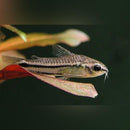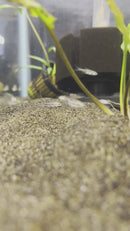Description
The Pygmy Corydoras, scientifically known as Corydoras pygmaeus, is a charming and diminutive species of freshwater fish highly sought after by aquarists for their small size, peaceful demeanor, and engaging behavior. These tiny catfish belong to the Corydoradinae subfamily and are admired for their endearing appearance and social nature.
Measuring only around 1 inch (2.5 centimeters) in length, the Pygmy Corydoras are among the smallest in the Corydoras genus. Despite their small stature, they possess a remarkable beauty characterized by a sleek, elongated body and a striking pattern. Their base coloration is a shimmering silver or light bronze, accentuated by a series of dark spots or patches that run along their sides from head to tail, creating an intricate and captivating mosaic-like pattern.
These fish are known for their social behavior and are best kept in groups of at least six or more individuals. Their schooling nature becomes more pronounced in larger groups, where they exhibit fascinating behaviors like foraging together along the aquarium substrate and exploring their surroundings.
Pygmy Corydoras are peaceful and non-aggressive, making them an excellent addition to community aquariums. They coexist harmoniously with a variety of tank mates, provided the tank is well-maintained and suitable for their needs. They prefer a planted aquarium with plenty of hiding spots like dense vegetation, driftwood, or caves, offering them security and shelter.
In terms of diet, Pygmy Corydoras are omnivorous and primarily feed on small crustaceans, insect larvae, and plant matter in their natural habitat. In captivity, they readily accept high-quality sinking pellets, flakes, and small frozen or live foods such as daphnia, brine shrimp, and bloodworms. A diverse diet helps maintain their health and vibrant colors.
Maintaining stable water conditions is crucial for the well-being of Pygmy Corydoras. They thrive in clean, well-oxygenated water with temperatures ranging between 72°F to 78°F (22°C to 26°C) and a slightly acidic to neutral pH level (6.0 to 7.5). Regular water changes and adequate filtration are essential for their health and vitality.
Payment & Security
Your payment information is processed securely. We do not store credit card details nor have access to your credit card information.



